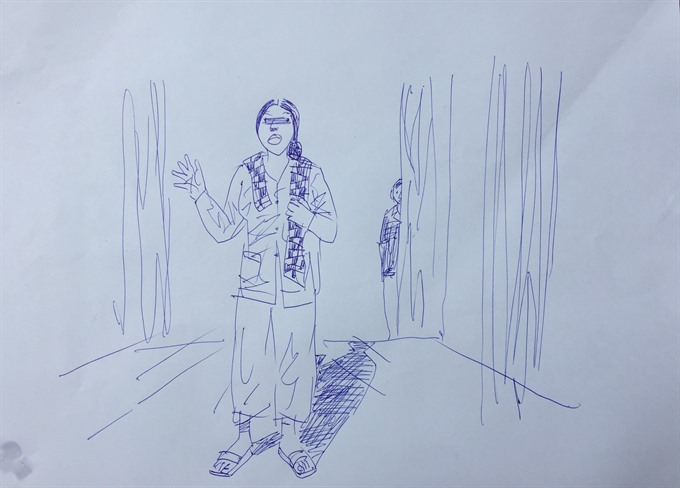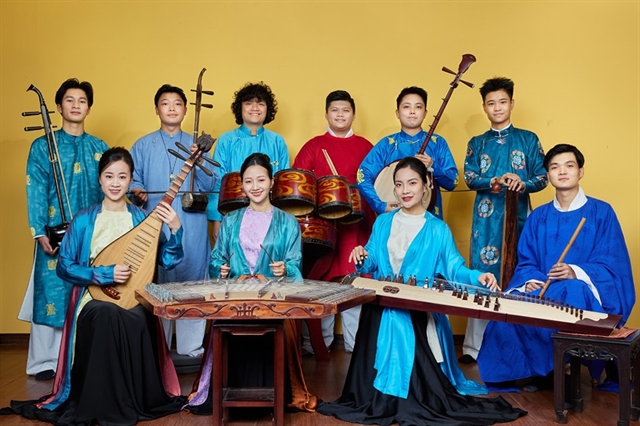

A short story by Nguyên Chương
 |
| Illustration by Đào Quốc Huy |
By Nguyên Chương
For a whole year, whenever Hùng, a doctor, worked a night shift, his wife Ngọc would also be away from home, but Hùng’s aunt Hai wasn’t worried about that. But today, Hai suddenly felt very nervous when she saw the doubt in Hung’s eyes in the afternoon. She was feeding her grandniece An when Hùng came home. Hai was dumbfounded:
“What! You’re home so early today!”
Hung said that he had left something at home. Hearing his daughter crying, he asked:
“Where is my wife?”
“She, she said she was going out with her friend and she would be back soon,” Hai said falteringly.
Hùng wasn’t working the night shift today. He knew his wife wasn’t at home when he worked a night shift, he could guess where she was. He raced to where the đờn ca tài tử (a typical southern folk art) singers and cải lương (a theatrical art in the south) performers met. He stopped in front of a restaurant where his wife had once told him that artists from the Reformed Theatre Club had set up to earn a living.
Since the restaurant had opened, the artists’ lives had improved. It seemed as if the founding fathers of the art had blessed them. Hùng remembered that when they went past the restaurant once, his wife Ngọc boasted: “I used to perform in this restaurant, so well I was given tips.”
One night, Hùng woke up without his wife by his side. He went looking for her. As soon as he got to the second floor, he saw Ngọc practising her singing. She was startled upon seeing her husband. She entreated Hùng:
“Please, let me go and sing in peace. I miss the stage and music so much.”
Hùng silently glared at her. Ngọc turned away to avoid his stare. It was synonymous with his disagreement, she understood. They had agreed after the wedding that Ngọc would not sing any more. Hùng did not want his wife to be a cải lương performer.
Ngọc wanted to forget the theatre and everything related to cải lương singing, but she couldn’t seem to shake it.
“Cải lương is in my blood!”
“Do you love the stage more than me?”
“If you are the air, cải lương is my blood. Without one of these things, I will die!” she sobbed.
She was head over heels in love with her husband, so she eventually decided to give up her passion. Yet, the founding fathers seemed to want to her to perform the role of Thúy Kiều in The Tale of Kieu. Ngọc missed her job so much it drove her insane. Her friends gossiped about her:
“This girl is off her rocker. Her husband is a doctor for crying out loud! Any girl would kill for her life, but all she wants to do is perform cải lương. What a nutter she is!”
“She should have been punished by the founding fathers!”
********
Hùng went straight into the restaurant. He sat down and ordered a beer. He could see Ngọc walking onto the stage in a colourful costume. Hùng felt a lump in his throat and wanted to drag her off the stage and take her home. Sad music started playing.
When Ngọc and Hùng were first dating, her mother Nga often said to her daughter:
“I don’t think you two are a good match”
“Why, mother? He has got a good education. Don’t you like him?” Ngọc said, rolling her eyes.
Her mother heaved a deep sigh:
“No, I like him very much. But one of you lives on earth and the other lives in the clouds. If you both want to live with each other, you’ll have to quit your job. I doubt Hùng will marry you if you keep on singing cải lương.”
Nga knew this because she was also a cải lương singer. She loved her job so much that her husband had one day jumped onto the stage and dragged her home. Nga did not want her daughter to suffer that, she told her to quit before marrying Hùng.
After the wedding, Ngọc took a vocational course so she could find another job. Yet, the music was calling to her. One day, when Hùng came home, Ngọc was gone. She had left without a trace. He found the note she had left behind: “Please, forget me, forget your singer. I am not meant for you!”
How could Hùng forget Ngọc who had helped him find a cheap enough house so that he could continue studying in medical school? Ngọc had helped him while he was struggling. A poor student in a part of the country only rich in the sun and the wind, Hùng fell in love with Ngọc. When Ngọc went to on the road to perform, Hùng missed her as if he was missing a limb.
********
Upon hearing that Ngọc had married, all the cải lương club members were disappointed, because Ngọc was the star. Since she left the club and restaurant, business had suffered. Ngọc felt great pity for her former colleagues. So, whenever Hùng worked a night shift, Ngọc went to sing in the club. Bigger and bigger audiences came to see her. But Ngọc was ignoring the great risk she, like her mother before her, had taken.
Having finished performing as Thúy Kiều, Ngọc was given a bouquet of roses from a young man. To everyone’s surprise, he embraced Ngọc and kissed her passionately. Sitting among the audience, the sound of their most lips smacking as the crowd roared its approved cut deeply into Hùng. In a rage he hurried straight home.
After the performance, Ngọc quickly went home. As soon as she entered the house, she saw Hùng standing there, waiting for her.
“Where have you been?” Hùng asked, looking straight into her eyes.
Ngọc felt so weak that her handbag dropped onto the floor.
“I…. I…..”
Hùng said in a cold voice:
“I’ve just came from the restaurant, from your cải lương club.”
Ngọc sobbed:
“Oh, my dear! Let me sing again. I can’t live without. Without me, the club is lost!”
“If you want to, sing to your heart’s content, but don’t come back here!” Hùng screamed as he slammed the door. Ngọc left the house and wandered aimlessly. In the yellow street light, Ngọc cried and shrieked with laughter. She began singing as if she was being haunted by a ghost.
Passers-by stopped and enjoyed her singing. One woman recognised Ngọc and said:
“What’s going on here? You’re the singer Bạch Ngọc. Why are you here?”
Ngọc went on singing. Some young men went by, saying:
“Look at her! She’s off her barnet!”
The crowd followed her. An old woman heaved a deep sigh upon seeing Ngọc singing cải lương:
“This lady is singing for the last time before quitting her job.”
Nearby there was a swift river flowing.
Translated by Mạnh Chương









